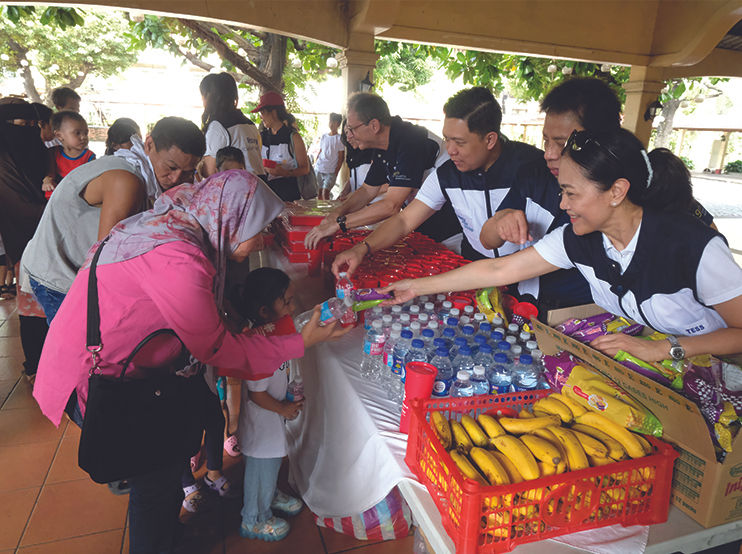RC Makati Participates in Marikina Watershed Reforestation Project
- Rotary Club of Makati
- Apr 14, 2025
- 3 min read

In an effort to restore the Marikina Watershed and improve the local ecosystem, RC Makati, in collaboration with the Rotaract Club of Makati and the Interact Club of General Pio Del Pilar National High School (GPDPNHS), participated in a vital environmental initiative at the Pamitinan Protected Landscape in Montalban, Rizal. The event, held as part of the Marikina Watershed Reforestation project, focused on reforesting the watershed to enhance water regulation, mitigate flooding risks, and rejuvenate the environment. Led by RC Makati and RC Makati F. Zobel, and supported by various Rotary clubs in District 3830, the project is a key initiative to restore one of the region’s most important natural resources.
Despite the Sunday being a typically reserved family day, Pres. Keith Harrison and PND Chris Ferareza chose to dedicate their time to this crucial environmental effort. Joining them were First Ann Rachel Harrison and their son, Julyan, as well as Pres. Alex and Lucille Lopez from RC Makati F. Zobel, Pres. Vilma Alas from RC Makati McKinley, PP CJ David from RC Makati Ayala Triangle, and PP Butch Madarang from RC Quezon City Circle of D3780. Also present were members of the RAC Makati, led by Pres. Hira Hermoso, and 15 members from the Interact Club of GPDPNHS, accompanied by their adviser, Mrs. Arlene Okuma.
The day began with a safety briefing, particularly for the younger participants, before heading to the bamboo nursery managed by the Samahan ng Kawayan sa Karugo Agri-Farmers Association. The main task of the day was not planting, but bagging young bamboo shoots in preparation for their future planting in the Marikina Watershed. The goal of the project is to plant 4,100 bamboo plants across 20 hectares, with the actual planting expected to begin around June or July. This work is crucial to the restoration of the watershed, as bamboo plays a key role in stabilizing the soil and improving water quality.

During the activity, Pres. Keith shared his thoughts on the importance of environmental conservation and inclusion, relating a personal story about his son, Julyan, who lives with autism. He emphasized the value of involving everyone in community efforts, regardless of their background, and encouraged the participants to engage deeply with sustainability projects, illustrating that each person can contribute to making a meaningful impact on the environment.
PND/VP Chris Ferareza also spoke on the importance of sustainability in both business and community work. He underscored the Rotary Club’s commitment to reducing plastic pollution and highlighted the Club’s collaborations in environmental conservation, such as efforts on Pagasa Island and with the University of the Philippines Los Baños (UPLB) on reforestation projects. His message stressed the need for local community involvement in creating sustainable spaces, pointing out that true environmental stewardship is built from the ground up, with contributions from people at every level.
FA Rachel Harrison addressed the link between environmental sustainability and human rights, drawing from the UN’s publication, Climate Change and Human Rights for the Youth in the Philippines. She urged the youth to actively protect the environment, emphasizing that environmental conservation is essential to ensuring human dignity. She also highlighted the role of bamboo farming in promoting sustainable lifestyles, advocating for cross-generational collaboration in leading environmental efforts.
Lastly, PP Butch Madarang and a local tribesman guided in the practical art of bamboo cutting propagation—an eco-friendly alternative to traditional hardwood planting. They demonstrated how to select a healthy bamboo stalk with at least two nodes, carefully cut it at a 45-degree angle, remove excess leaves, and plant it in well-draining soil with proper moisture and shade. This hands-on learning emphasized bamboo’s significant environmental and economic advantages. Unlike hardwood trees that take up to two decades to mature, bamboo is harvestable in just three years, offering a sustainable livelihood for communities. Moreover, mature bamboo plays a vital role in climate resilience—it absorbs up to 500 kilos of carbon dioxide and produces 300 kilos more oxygen annually than typical trees. Its water retention capacity also helps mitigate flooding and erosion, while its endemic nature ensures high survival with minimal maintenance.
Though the focus of the event was on bagging bamboo, the day exemplified a collective commitment to environmental stewardship. The Marikina Watershed Reforestation project is making steady progress, with plans to plant the 4,100 bamboo shoots, carefully monitored and nurtured as they grow. The event demonstrated the power of collaboration between Rotary members, Interactors, Rotaractors, and the local community in building a sustainable future for the region.
As reported by the Samahan ng Kawayan, the planting process officially began on July 31, 2024, and continued through August 17, 2024. The bamboo plants have been monitored and cared for from February 24, 2025, to March 3, 2025. By this report, 3,570 bamboo plants have successfully survived, while 510 plants did not make it. This progress serves as a testament to the ongoing dedication of all involved to restore the Marikina Watershed and contribute to a greener, more sustainable future.














Comments